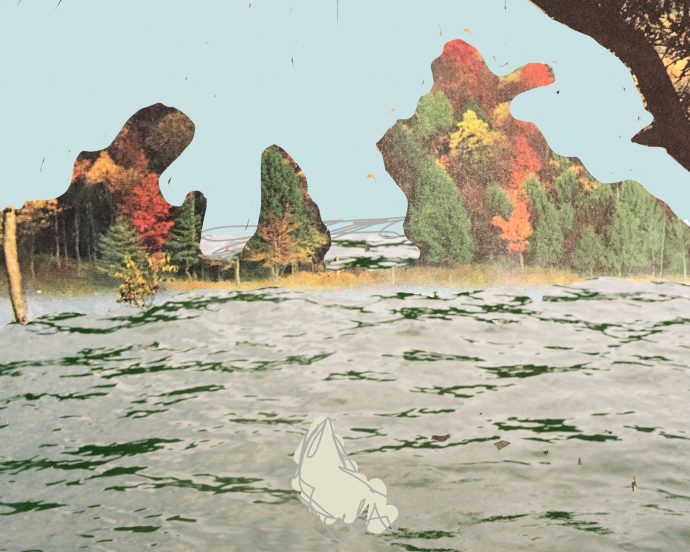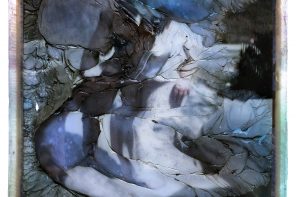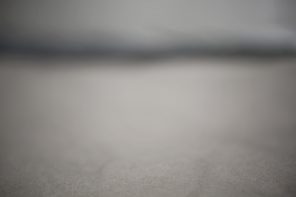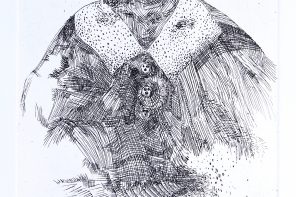Karl finally arrives home. With him in the car is his mother, she sits in the passenger seat as he rolls down the driveway.
“Move!” he shouts to Asta, one of his twin girls who stands blocking his approach.
“Not until you give me my grandmother,” Asta shouts back at him and slams her open hand on the hood. She runs over to the passenger side and pushes her nose against the window and raps on the glass with her forefinger. “Peekaboo, grandma.” His mother does not react.
They’ve driven non-stop from the hospital, where she’s been all week. She’s slept through most of the trip with her head gently rocking back and forth and her mouth wide open. There’s a childish air about her; she jerks, she suddenly gets uneasy, but when he puts his hand on her cheek, she calms down in an instant. She’s like a house someone broke into; inside of her everything’s been turned upside down, the furniture’s been shifted around to unfamiliar places, or simply knocked over, leaving the legs sticking into the air.
There is going to be a sliding transition from her sickness to her getting well again, the medical expertise says. After a mental breakdown the brain needs time to heal itself. She needs her rest. He hopes that he made the right decision in bringing her here.
“We’re here,” he says as he gently puts his hand on top of hers. She smiles from her far-off place, her neck bare in the coat opening, her skin grey.
Had she been someone else, maybe someone else’s mother, he would have arranged for another means of transport, an ambulance, or at least some kind of qualified patient transport. He’s heard her say the rudest things over the last few days.
He gets out of the car. Behind it he sees Anna, the other twin, sneaking up on them. “There you are, grandma,” Asta whoops and jumps on her grandmother’s back as Karl helps her out of the car. He has to pry the child loose and push her off. “You’re grabbing me too hard, you big idiot,” she yells, and now Anna’s arrived.
“My Anna,” his mother says and puts her arms around her grandchild. “My sweet little darling.”
He looks towards the front door, searching for his wife, Helle. It’s only been a few days since he told the twins that their grandfather has died, and he isn’t sure they remember the rules on how they’re supposed to talk about it. Don’t ask too many questions. Don’t ask right away. And could they at least refrain from mentioning the subject until they’re all inside.
Asta runs to her grandmother and stares into her eyes. “Is it true that grandpa is dead?” she asks.
Luckily, Helle comes out of the house. She goes to his mother and puts her arm around her. “Come,” she says, “come with me, I’ve made you some tea.”
“Yes, grandma, you have to see our rabbits!”
His wife walks his mother to the house with the twins trailing after. It’s getting dark, and by a sudden impulse, he gets back in the car. He tilts back the driver’s seat. His body cools off quickly in the car’s air-conditioned interior. In a moment, he’ll start feeling the chill. He closes his eyes.
“Are you sleeping in there?”
Karl jumps in the seat. Helle is standing next to the car.
“No, no,” he says.
Helle looks at him inquiringly. “Are you all right?”
“Yes, sure.”
She doesn’t believe him.
“Did my mom say something?” he asks her.
“What do you mean? What would she say?”
“Well, I don’t know, she’s just a little confused sometimes. You have to keep in mind that she’s completely burnt out. She probably can’t even remember half of what’s happened.”
Helle looks as if she thinks he’s exaggerating.
“She lived with my dead father for days, you know,” he says.
“Yes, yes,” Helle says. She smiles. “I’m perfectly aware that she’s not well. The girls have shown her the rabbits. She liked that. I took her upstairs to rest. She sat in the bed, sound asleep, with the girls crawling all over her.”
“Did you leave her to herself?”
“I left the door open so she can call out for me if she needs me.”
Karl touches his breast pocket. Maybe he should give his mother the sleeping pill right away. He wouldn’t want her to wake up before he himself can get some sleep.
“She is very sad because grandpa is dead,” Anna says and curls up on the couch as he enters the house.
“But she gave us this blanket,” Asta says and shows him the blanket his mother wore on her legs for the drive. “It used to belong to granddad.”
Anna sniffs the blanket. “I can smell grandpa inside of it.”
“Yes, there’s been some crying,” Helle says, standing by the kitchen table. “The girls are really good at comforting.”
After they’ve finished dinner, and the girls have been put to bed, he goes to the bathroom. His eyes are bleary, and he needs to shut them. His mother has been asleep all evening, except for the time when she needed to go to the bathroom. It’d been quite a task keeping the girls away from the second floor; time and again they seemed to find excuses to go up there.
“It’s good that you brought your mother here.” Helle steps into the bathroom. She caresses his shoulder. “She needs someone like you, and the girls are happy that she’s here.”
“I’m not too sure about that,” he says and brushes off her hand. “You just never know when you deal with her. I don’t think anyone’s ever known what she needs. Except from my dad, that is.”
“I don’t like it when you talk about your mother that way.”
“But it’s true,” he says. “She’s weirdly cold inside.”
“You’ve seen how she is with our children. Is she cold when she’s around them too, you think? You’re just tired, my friend. You need a break.”
“You’re different, Helle, I don’t think you understand my family. But that’s ok.”
He tears the towel from its hanger.
“I just don’t get you,” she says as she leaves the bathroom. “I thought we could talk.”
“We can. As soon as we get this over with.”
“Who says it’s ever over?” she asks and sticks her head back in through the open door. “Now, come to bed. I miss you.”
He fills the sink with cold water, bends over, and sticks his face in it. Gasping, he straightens himself; his skin reddens all the way up to his ears. He is grateful for the friendly and straightforward way Helle accepts his mother into their home. “Can I leave the door open for the night?” his mother had asked before she got back into bed. “Of course,” Helle had said, “Of course you can.”
Helle is the one who eases things and makes everything move along smoothly with her positive intimations: yes, good, of course, fine.
Karl wipes his face and looks at his watch. It’s half past nine. He hopes Helle hasn’t gone to sleep. He yearns to lie next to her warm body.
The next morning Karl wakes up with a jolt. The room is quiet. Helle has left the bed, and he didn’t even notice. From under the heavy curtains, sunlight floods the room. He hears the girls’ voices; they’re busy already playing in the garden. He gets out of bed and goes to the window. There they are on the other side of the rhododendron, next to the lakeshore. Asta has gotten hold of an oar; he hasn’t hauled in the little rowing boat as he’d planned. It lies moored there among the reeds by the jetty, freshly painted. Warily he opens the window.
“He didn’t do it right,” Asta yells out to Anna. “They’re full of splinters. I keep getting them into my fingers.”
Through the winter, he worked on the boat; in his spare time he would plane, grind, and make it ready for the summer, but the rowing boat has caused nothing but trouble. The girls can’t seem to stay away from it; they board it and crawl around in it whenever they get the chance, and neither of them can swim.
“Dad!” Asta has spotted him. “Da-ad?”
“Don’t get in the boat without the life vests on. I told you a million times,” he shouts back and turns around to get a shirt from the wardrobe.
Suddenly he remembers his mother. He runs to the corridor and up the stairs to the room where she’s supposed to be sleeping. The door is open, but nobody’s in there. The contents of her bag are all over the bed. Helle is gone too, and down by the lake he hears the girls; she has left them on their own.
He throws on a scarf and hurries into the garden. The rowing boat, normally moored by the aft at the jetty, has been towed to the lakeshore. How in the world the girls got it there he can’t fathom, but there it is, accessible to them.
“They’ve gone for a walk,” Anna says and hoists the oar like a flagpole. “That’s what they said, anyway.”
“What’s that basket doing in the boat?” he asks.
“It’s just the rabbits. It’s good for them to get a little fresh air.”
Karl draws in a deep breath. “But where did they go?” he asks and tries to calm himself down. He feels like throwing the rabbits into the lake, dragging the twins back up to the house, and locking them in.
“That way,” Anna says and points towards the trees.
“You’ve got to take your rabbits back to the house,” he says. “They’re fragile animals; they don’t like being this close to the water.”
He leaves the girls and runs back up to the house. He can’t imagine that Helle and his mother would go anywhere but into the woods. Behind the carport, he finds Helle’s bike. He jumps on it and takes off. Soon, he’s put the house behind him, and he approaches the woods. Nothing wrong with his wife taking a walk with his mother, but she should have told him. Now he’s biking around like a fool. As he enters the woods, he leaves the bike and starts walking.
The morning is cold and clear, the woods are silent, even the rooks are quiet, and the leaves are a deep yellow; they fall softly from the treetops like tiny sails, and he feels like shouting.
Some way out in front of him on the path that cuts through the woods, he sees two figures. The red coat could be Helle’s. Now that he knows where they are, he could turn around and go home. But he doesn’t want to. The bile in his throat has to come out somehow. He has to get it out. He starts to run, and as he is about to catch up with them, he coughs to let them know that he’s there. Helle turns around in surprise.
“You can’t just leave like that,” he says before she gets the chance to speak. His voice is excessively sharp, but he cannot control it. “It’s totally irresponsible. Don’t you realize she’s ill? What were you thinking?”
The two women hold each other’s arms. If you didn’t know better, you’d think that they were mother and daughter, cozily enjoying each other’s company.
“What’s wrong with you?” Helle asks.
His mother just stands there staring, ignorant of her part in this. How nice it must be not having to decide on any matter. She’s lost it. And that makes everything okay.
“You left the girls alone. They’re fooling around down by the water. I hope you realize that,” he says.
“But dearest Karl. Can’t we have a moment on our own and go for a stroll? Can’t you do without your wife for a few minutes?” his mother says and steps in front of Helle.
So that’s where they are. Stuck in one of her moments. Surely, she’ll go on to express how she feels about him; what was the word she used the other day when she was still in the hospital? Was it ‘pathetic’? She thinks he’s ‘pathetic’ because of the way he tries to guard himself against the realities of life. “I bet you’ve taken out insurance policies on your children,” she had said. “But things do happen. They happen anyway, Karl. You can’t guard yourself against coincidence or against other people.”
With a nod of the head, he tries to catch his wife’s eye to let her know that everything is under control; that he’ll take care of everything.
“As we were just saying, Helle and me, it’s very nice of you to keep an eye on me,” his mother says. “But you should have been there when we needed your help. Now it’s too late. I made you, you came out of my womb. And if you think I need a nanny now, you’re wrong.”
Helle steps up and takes his mother’s arm again. “No,” she says, looking her in the eye. “That wasn’t what we were talking about. Still, it’s good that you’re here with us. Where else would you be? Come, let’s go home.”
Helle starts to walk, but Karl is dead in his tracks. “Are you coming?” she asks, turning and looking at him.
He doesn’t answer. He looks back at her, taking in her full figure as she walks away, leaving him standing alone on the path. The morning is cold and clear, the woods are silent, even the rooks are quiet, and the leaves are a deep yellow; they fall softly from the treetops like tiny sails, and he feels like shouting. He feels like shouting and running the hell away from it all.
He doesn’t know for how long he’s been running, but he’s drenched in sweat when he finally sees his driveway. His mood is lighter now, his confidence is almost restored, and everything is going to be all right; he’s sure of that.
Then, like distant bells, the girls’ voices reach him; apparently, they’re still in the garden. He stops next to the house; he rests his hands on his knees and tries to catch his breath. Now, he can hear Helle too. She is shouting something to the girls, but he can’t make out the words. Still out of breath, he stands up straight and focuses on the voices; an icy feeling tingles his spine. There’s an unfamiliar ring to her voice, her tone is different, and now he hears Asta too. It isn’t joy he hears, it’s something else.
With a muffled whimper, he sets off and sprints around the house; he beats through the thick hedge and into the garden.
They’re down by the lake, his mother is halfway into the water, and he runs to them.
The rowing boat is in the reeds. Next to it, Anna is splashing about, and in the boat Asta is struggling with the oar. “Grab it, grab it,” she screams, as she tries to get Anna to latch on to the oar.
He can see Anna’s tiny head bopping up and down along with the movement of the water, her curly hair drawn out like fluorescent silk ribbons. “Anna, Anna,” he yells, though he’s only a few yards away from them now. He runs out onto the jetty and thrusts himself forward arms first into the water. He grabs Anna by the hair and pulls her to him. “Get a blanket!” he barks at Helle, who has waded out to help his mother back onto the shore.
His eyes are stinging, and the child wriggles. Her clothes are wet and heavy, and below the surface he can see her red rubber boots; they have come off in the struggle, and the sight makes him boil inside. He wades and stumbles to the shore with Anna in his arms to Helle and his mother.
“You never could take care of fucking anything or anyone at all, could you?” he screams at his mother. “You only think about yourself. It’s always about you. Not once did you make a sacrifice for us. You don’t give a rat’s ass about us. You don’t care about us at all. See what you’ve done now? Are you happy now? Are you satisfied?”
It just pours out of him, and he can’t stop, even though his mother is standing right there in front of him with her narrow shoulders and her hollow chest, looking like a wet animal.
“But nothing happened,” she mumbles and accepts the blanket Helle is handing her. “Nothing bad happened.”
He feels Anna’s body against his belly. She is so quiet in his arms. Like a much younger child, she clings to him; only her rhythmic breathing tells him that she’s alive. He runs out of steam. What good is it, all of this?
“Where’s Asta?” Helle says.
None of them has given Asta any thought, and now she’s gone. “Go find her instead of just standing there!” he blurts out and lets himself fall to the grass with Anna in his arms.
Like chickens with their heads cut off, Helle and his mother run around searching for Asta. They run towards the house, shouting her name.
Karl focuses on Anna. “That was scary, huh?” he says and hugs her. She curls up even closer in his arms.
Then he looks up and sees two bare legs in the hedge.
“Helle, she’s down here!” he shouts.
His wife comes running back to him. He leaves Anna with her and runs to the hedge. He squeezes through the thick growth. He has to get down on his knees to try to get to Asta, and still he can’t get all the way in.
“Asta, please come to me,” he calls out.
She has taken off her clothes. She stands in there in her underwear; in the shade her skin is almost purple.
Asta hides her hands behind her back. “I didn’t do it,” she says.
“Of course you didn’t do it,” he says and reaches out for her.
“I don’t want to go.”
“Why did you take off your clothes? Come with me, you’re getting cold in here.”
“They were all wet.”
“Did you go into the lake too?”
She shakes her head.
“Nothing happened,” he says and attempts a smile. “We just got really scared. I don’t mean any of the things I said.”
Suddenly, she bends forward and shoots out of the hedge. He sees her white backside, her wet underwear, and her legs sprinting away. When he makes his way out, she has reached the others. She throws herself at her sister, and for a moment, Asta’s broad shoulders and long limbs and Anna’s slightly chubby body merge into one. One twin’s skin a golden brown after a summer of sun, the other twin’s nearly a metallic white, both dotted with goosebumps. Asta clings to Anna almost as if she’s attacking her. Then Anna starts to kick herself free and Asta has to let her go.
“She threw it into the lake,” Anna screams. “She took it, and she threw it out so far that it disappeared.”
“Who threw what into the lake?” Karl asks and squats in front of the girl. “Tell me, Anna.”
“Oh no,” Helle moans from over by the boat. “The rabbits, did you take them with you on the boat?”
She lifts up the basket from the bottom of the boat. “But one of them is still in here.”
“I didn’t do it,” Asta says, trying to hide behind her grandmother. “I thought it could swim.”
Now he really has to control himself. With three long strides he’s next to Asta. He grabs the child by the arm. “Did you throw the rabbit into the water, Asta? Did you?”
His daughter kicks and screams, and now Helle comes forward, quickly snatching Asta out of his grip, and then she turns around and slaps him hard in the face. “Let go of my daughter,” she says. “Don’t you ever touch her again!”
He almost blacks out, maybe he’s fainting. He sinks to his knees with his hands on his face. Through his fingers, he can see the others start walking towards the house. They look alike, a small band of blanket-clad beings. Light as he felt less than an hour ago, his body now feels like lead. He drags himself to the rowing boat. None of them has spared a thought for the remaining rabbit; it’s still in the basket, quivering.
He draws the rowing boat back to the jetty and climbs in. When he has fastened the oars on the gunwale, he sits up straight and stretches his back. He looks at the basket he has put on the thwart. The hatch is open and the animal is gone. He looks around, confused. A few yards out, between the reeds, the rabbit floats on the water’s surface. His heart starts beating out of control. Against his own will he loosens the oars, casts off the mooring, and starts out as if he’d never rowed a boat before.
The fur is alive, pitching back and forth like the polyps of a sea anemone. When he lifts the animal from the water, the wet fur parts along its back and reveals the pink skin underneath. The rabbit has shrunk into almost nothing; a small handful with tiny teeth. He can’t help himself; he’s crying now. He sits in the boat with the rabbit in his hand, crying.
Translated from the Danish by Peter Breum
Iben Mondrup made her literary debut in 2009. She is the author of five novels, two of which have won major awards. Her novel Justine was published in the U.S. by Open Letter in 2016. The novel was shortlisted for the 2017 Pen Translation Award. She lives and works in Copenhagen, Denmark.
Peter Breum nourishes a lifelong passion for American, British and Scandinavian literature, language, and translation and lives in Copenhagen, Denmark.




